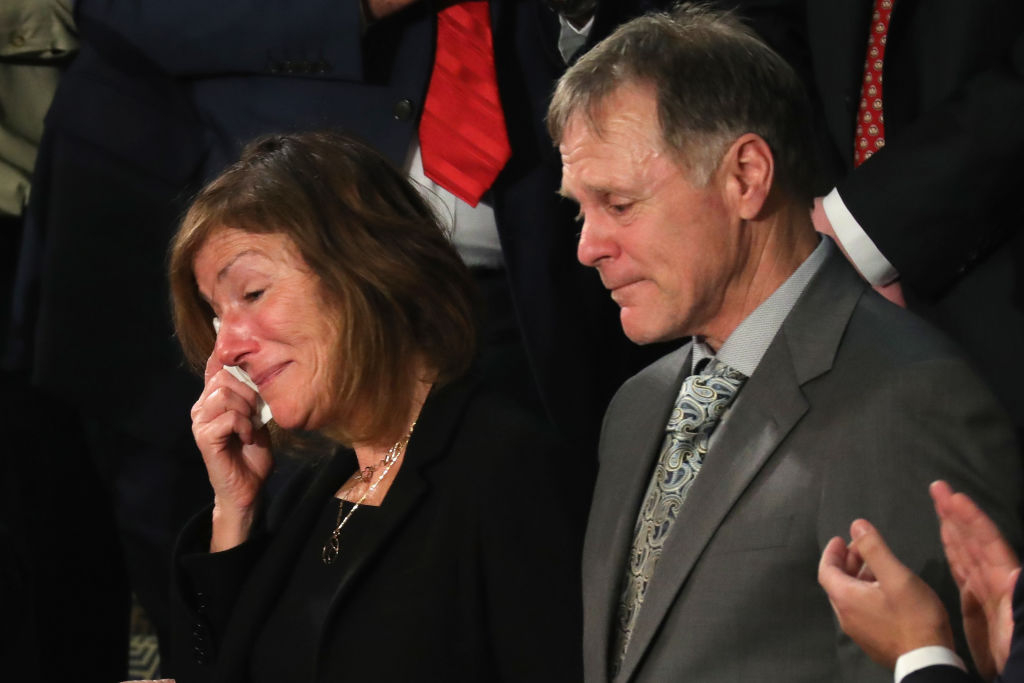|
In this mailing:
- Gordon G. Chang: To Disarm North
Korea, Hit Hard on Human Rights
- Leni Friedman
Valenta and Jiri Valenta: Ukraine: To Die
in Mariupol
by Gordon G. Chang • March 12,
2019 at 5:00 am
- American leaders
have been wrong. The best way to get what we want from North
Korea, whether it be "denuclearization" or anything
else, is to reverse decades of Washington thinking and raise
the issue of human rights loudly and incessantly. The same is
true with regard to North Korea's sponsor and only formal
ally, the People's Republic of China.
- Kim Jong Un knows
how inhumane his rule is -- he has, after all, had hundreds of
people executed -- so if we do not talk forcefully about, say,
Otto Warmbier, Kim will think we are afraid of him. If he
thinks we are afraid of him, he will see no reason to be
accommodating. It is unfortunate, but outsiders cannot be
polite or friendly.
- It is time to let
Kim know that America no longer cares about how he feels or
even about maintaining a friendly relationship with him. That
posture, a radical departure from Washington thinking, is both
more consistent with American ideals and a step toward a
policy that Kim will respect.

U.S.
President Donald Trump believes he faces a dilemma: that his
efforts on behalf of the parents of Otto Warmbier -- the University
of Virginia student whom North Korean authorities detained,
brutalized and killed -- undermine his ability to take away nuclear
weapons from Kim Jong Un. Pictured: Fred and Cindy Warmbier, Otto's
parents, are acknowledged during President Trump's State of the
Union address on January 30, 2018. (Photo by Chip Somodevilla/Getty
Images)
"I'm in such a horrible position, because in
one way I have to negotiate," U.S. President Donald Trump said
at CPAC on March 2, while talking about efforts to disarm North
Korea. "In the other way, I love Mr. and Mrs. Warmbier, and I
love Otto."
Trump believes he faces a dilemma: that his efforts
on behalf of the parents of Otto Warmbier -- the University of
Virginia student whom North Korean authorities detained, brutalized
and killed -- undermine his ability to take away nuclear weapons
from Kim Jong Un, the leader of that horrific regime.
The president at CPAC summed up his perceived
predicament this way: "It's a very, very delicate
balance."
But is there really a "delicate balance"?
Trump and predecessors have thought they should not vigorously
raise human rights concerns while negotiating on various matters
with the ruling Kim dynasty of the Democratic People's Republic of
Korea (DPRK).
by Leni Friedman Valenta and Jiri Valenta
• March 12, 2019 at 4:00 am
- Although Russian
President Vladimir Putin has not articulated the final
objective of his proxy war in eastern Ukraine, his actions
seem to indicate that he is determined to create a land bridge
from Mariupol to Odessa -- two major seaports vitally
important to Ukraine's economy. Putin's overall strategy in
Ukraine, also not publicly stated, seems to be to strangle it
economically by disrupting shipping between the Odessa and
Azov Sea ports, with the aim of eventually subjugating Ukraine
to Russia.
- "If Putin wants
to do something about Mariupol," a Ukrainian sailor said,
"he has only a short time in which to do it. We have a
small navy. We hope your country [America] will give us more
ships to defend the port."
- "This
time," said a Ukrainian army platoon leader at the front,
"if the Russians come, we are not going to let them
through. We would rather die."

On
November 25, 2018, the Russian Navy attacked three Ukrainian ships
in the Sea of Azov that were heading in the direction of the
Ukrainian city of Mariupol. Pictured: Ukrainian Border Security
Force soldiers patrol the coast of the Sea of Azov near the Port of
Mariupol, on November 29, 2018. (Photo by Martyn Aim/Getty Images)
On April 3, 2018, Russian President Vladimir Putin
-- upon winning the war Syria while protecting his beleaguered
client, Syrian President Bashar al-Assad, from a rebel uprising
supported by the U.S. and Sunni Gulf states -- had some more good
news. US President Donald J. Trump had given instructions to the
American military to begin planning for the withdrawal of U.S.
troops from Syria. Although the official decision was announced
only on December 21, the Kremlin evidently gambled that Trump might
be serious about the withdrawal.
It was only on November 25, 2018 that the West
awakened to a new and potentially unsettling threat to world peace,
this time in the Sea of Azov. Putin, who had largely frozen his war
there in 2015, was now defrosting it. There had been no serious
response from the West.
|































No comments:
Post a Comment